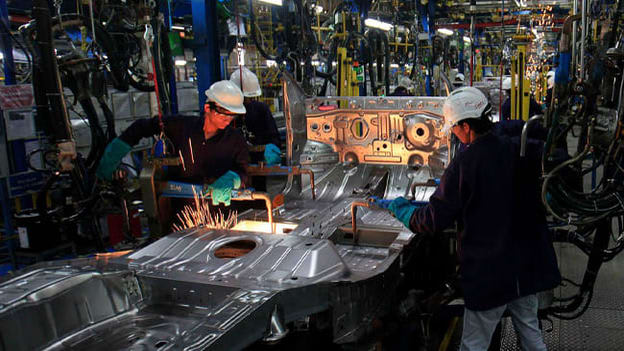Making the manufacturing industry 4.0 disruption proof: Leaders’ View

Since the outbreak of Covid-19, the manufacturing industry has gone through significant upheavals due to disruptions in the global supply chain – caused by containment measures and consecutive lockdowns. Over the last 18 months, the industry has witnessed new needs and demands emerging in the business context, e.g., increased focus on revenue and productivity, flexibility in operations, and production quality.”
In an expert panel discussion organized by People Matters and Harappa, eminent manufacturing sector leaders shared their views on what the manufacturing industry 4.0 looks like. In this exclusive roundtable discussion, HR and L&D leaders spoke about the challenges and opportunities that the pandemic led to and the sustainable approaches to help build a future-ready workforce.
Critical skill-sets missing in the manufacturing industry
Shobha Pandey, Regional Talent Management Leader and Diversity Lead at John Deere, noted that a digital boom is the need of the hour in the manufacturing space. Skills in analytics, AI, VR, 3D printing need to be honed and developed in the fast-changing environment that we encounter today.
“You need VR-enabled training to onboard your workforce on the shop floor or otherwise”, said Shobha. She also emphasized three critical terms in the current context of growth in the manufacturing industry - ‘Personalize, Digitize and Automize’ – that capture the essence of tomorrow-ready organizations.
When asked how to approach skill-building, leaders across the panel emphasized developing mindsets and capabilities as a key solution towards creating future employees and leaders equipped to deal with unanticipated changes.
Tolerance to ambiguity, compassion, humility, empathy, listening, resilience, and quick decision-making were the most crucial leadership competencies required to lead the industry with confidence and courage.
Key approaches to building new learning ecosystems
Mohit Kumar, President HR & Head of Learning and Talent, Hindalco Industries Ltd, said, “it’s important that the learning reaches to the last man standing.” The pandemic evolved the distribution and delivery of learning in many industries, including manufacturing.
An organization’s culture received a unanimous vote in building a sustainable and relevant learning ecosystem that enables strategy and produces the right leadership DNA. Culture building and innovative workshops should be organized for building mindsets and creating visionary leaders, intended to lead to hierarchy-free business models and set-ups, contributing to a healthy workspace.
Manoj Kumar Sharma, Joint President & CHRO at Aarti Industries, raised an important facet of the manufacturing sector: ‘system adoption’ so that the manufacturing workforce, especially in the blue-collar segment, can carry out their work efficiently and effectively.
Nilanjan Kar, CRO at Harappa, believes there is an urgent need to upskill workers based on business strategy. The industry needs to build scalable business models and learning infrastructure that produces uniform learning outcomes.
The manufacturing workforce has become much more resilient and stoical to deal with future challenges as they went through severe distress during the COVID-19 pandemic.
Commenting on the changes witnessed in the manufacturing space in the Covid-19 pandemic, Ajay Chowdhury, Senior VP & Head HR at SRF Ltd, said, “not much has changed in the manufacturing sector, you still need to go to the machines, and you still need to get your hands dirty...but the two things we noticed was the surge in agility and the ability to make quick decisions”.
The pace of digital transformation has accelerated due to the pandemic. And these changes require organizations to build systems to help people cope with this shift. At a time like this, voluntary mentorship programs can be beneficial where organizations identify and teach their employees the basics of mentoring, enabling them to build and cascade confidence among their peers and subordinates.
Speaking of transformation led by the pandemic, Sanjeeb Lahiri, CHRO, GRP Ltd, said, “resilience is the only key to face the wave”. At the same time, Shobha believes that a learner’s perspective should be given due importance in learning and development.
Key leadership skills that a leader needs to exhibit in these times
From being an accountability driver to a diversity champion, a leader needs to drive change successfully while leading high-performing teams.
Ajay Chowdhury, Senior VP & Head HR at SRF Ltd., noted that leadership qualities like compassion and empathy offer far more benefits in the long run than one can measure, including increased employee loyalty and meaningful work relationships.
Amongst many others, vulnerability, listening and communication are considered essential skills that govern the whole system. The panel agreed that all employees, irrespective of their grade, practice compassion, listening, and empathy, leading to a productive working ecosystem.
Speaking of ROI on learning, Mohit pointed out, “when we are working with large systems, the measurements do not come overnight.” Leaders on the panel suggested that one has to be patient to see the true impact of learning interventions and at times, the results will include many intangibles.
Significance of diversity in the manufacturing sector
The panelists were unanimous that diversity and inclusivity training programs help them tap into the untapped reservoir of potential in the workforce.
The diversity agenda is one of the most crucial elements amongst the many considered to shape tomorrow’s manufacturing industry. Sanjeeb believes that by not considering diversity and inclusivity, we would consciously let go of about 50% of the talent available in the market.
Ajay believes that diversity helps bring distinctive perspectives, vital to the growth of the organization and the industry. The panelists emphasized the need to understand diversity from the business perspective and give it due consideration in the immediate future.
----
To know more on social, cognitive and behavioral skilling, have a look at Harappa's website here.



